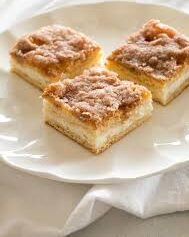Sopapilla Cheesecake Bars – A Healthier, Low-Carb Version
Sopapilla Cheesecake Bars are a delicious dessert with layers of soft, sweet pastry surrounding a rich cheesecake filling, topped with a mouthwatering cinnamon-sugar blend. They’re perfect for sharing, as they can be enjoyed without plates or forks, making them an ideal dessert for gatherings. What makes these bars even more special is that they are low carb, keto-friendly, gluten-free, grain-free, and sugar-free, which means you can indulge without any guilt. Inspired by traditional Mexican sopapillas, this recipe adds a twist by using a healthier, keto-approved dough, and a luscious cheesecake filling.
What are Sopapilla Cheesecake Bars?
Traditionally, sopapillas are fried pastries that are often drizzled with honey and served as a dessert or snack in Latin American cuisine. This healthier version, however, swaps the fried dough for a baked option using a mozzarella-based dough, similar to “Fathead” dough, commonly used in low-carb and keto baking. The result is a pastry-like crust surrounding a creamy cheesecake filling, dusted with cinnamon and sweetener, creating a delightful blend of flavors that satisfy your cravings without the carbs.
Why You’ll Love This Recipe:
- Health-Conscious: This recipe caters to those on low-carb, keto, or gluten-free diets. It’s sugar-free but still has a satisfying sweetness, making it suitable for anyone following a Trim Healthy Mama plan or anyone looking to reduce their sugar intake.
- Simple Ingredients: All ingredients are easily accessible and affordable, making this a budget-friendly dessert option.
- Easy to Make: If you’ve ever made fathead pizza dough, you’ll find this dough easy to work with, making it simple to prepare.
- No Special Equipment Needed: While a food processor is recommended to mix the dough thoroughly, you can mix it by hand if needed.
Key Tips for Making Sopapilla Cheesecake Bars:
1. Using Fathead Dough for Pastries:
Fathead dough, made from mozzarella cheese, cream cheese, and low-carb flours like almond and coconut flour, is often used in keto baking. It’s commonly seen in pizza recipes, but in this case, it’s used to create a pastry-like dough. Here’s how to ensure your fathead dough is perfect for this recipe:
- Melt the Cheese Properly: Use the microwave to melt the mozzarella in short bursts, stirring in between to prevent burning. The melted cheese should be smooth and stringy, similar to cheese fondue.
- Combine Ingredients Well: Using a food processor ensures that all ingredients mix thoroughly, making the dough more manageable and preventing any unmixed strands of cheese.
- Wet Your Hands: When handling fathead dough, wet your hands to make it easier to press the dough into the pan without it sticking.
2. Cheesecake Filling:
The cheesecake filling is simple yet indulgent. A mix of cream cheese, sweetener, vanilla, and eggs creates a creamy layer that contrasts beautifully with the pastry-like dough. Be sure to:
- Soften the Cream Cheese: This will help the ingredients mix more smoothly.
- Mix Thoroughly: Use an electric mixer or food processor to ensure the filling is smooth and free of lumps.
3. Topping with Cinnamon and Sweetener:
A blend of cinnamon and a low-carb sweetener (such as erythritol, monk fruit, or a blend like Joy Filled Eats Sweetener) sprinkled on top of the dough gives the bars that characteristic sopapilla flavor. To enhance the flavor, drizzle melted butter over the top before baking.
Tricks to Perfect Sopapilla Cheesecake Bars:
- Dough Thickness: Press the dough out evenly to avoid overly thick or thin spots. Using parchment paper can help with this.
- Baking Time: Bake until the bars are puffed and golden brown, which usually takes around 50-60 minutes. If the top starts to brown too much, cover it with foil to prevent burning.
- Butter Brushing: If you notice butter pooling in the center during baking, use a pastry brush to distribute it over the top for even coverage.
Storage and Serving Suggestions:
These bars can be stored in an airtight container in the refrigerator for up to 5 days. They can also be frozen for up to 2 months. Before serving, allow them to thaw at room temperature or reheat in a low oven for a few minutes to bring back their warmth and softness.


